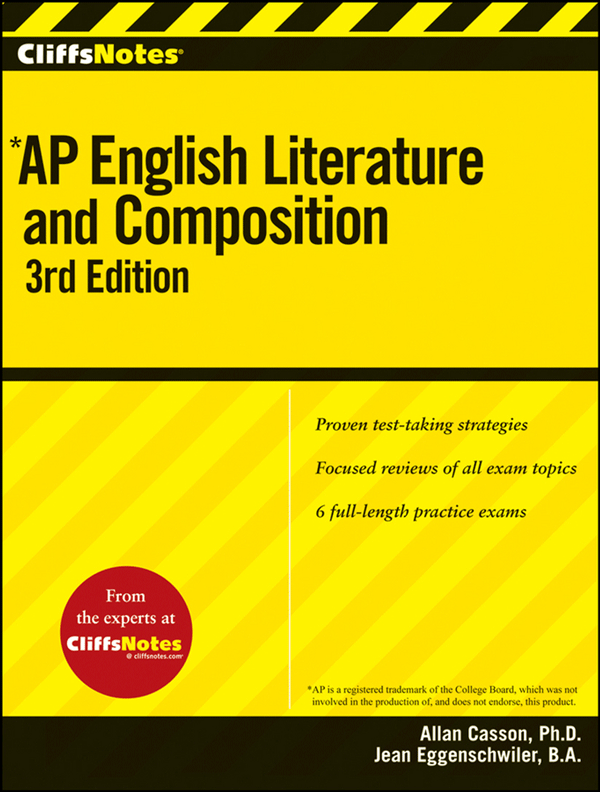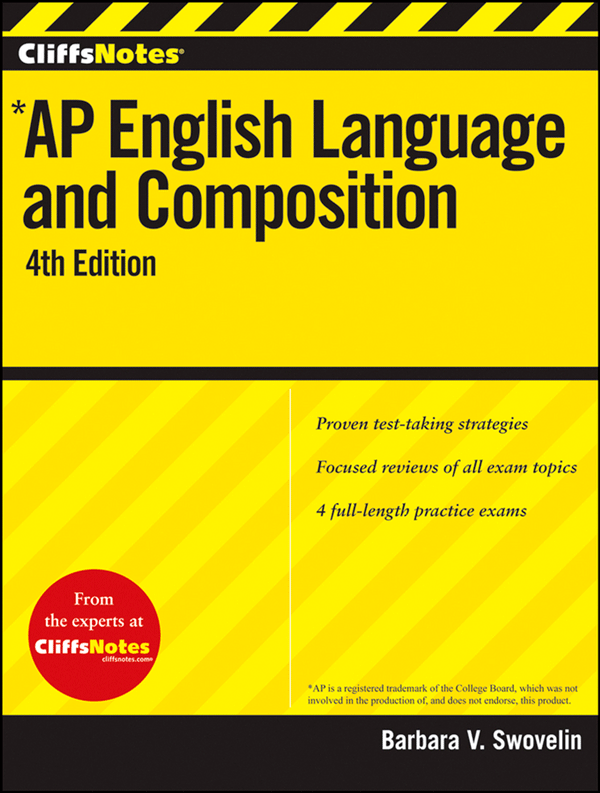Buy The AP English Literature CliffsNotes Book Here and the AP English Language CliffsNotes Book Here!

 The free-response section of the AP English Language and Composition exam requires you to write three essays — a synthesis essay that requires reading several passages, an argument essay that presents a single passage, and rhetorical purpose analysis that calls for exploring an author's ideas in greater depth. Students are given 2 hours and 15 minutes to complete the essays. (This includes an extra 15 minutes exclusively for reading the passages for the synthesis essay.) The suggested time for writing each essay is 40 minutes. You must complete all three essays within the 2-hour writing time limit. You must write an essay on each of the three essay topics; you will have no alternative choices. Each of the three essays is equally weighted at one-third of the total essay score, and the total for the essay portion equals 55% of the entire AP test score. You will be given an essay-writing booklet in which to write your essays; the actual test booklet includes some blank space to plan your essays.
The free-response section of the AP English Language and Composition exam requires you to write three essays — a synthesis essay that requires reading several passages, an argument essay that presents a single passage, and rhetorical purpose analysis that calls for exploring an author's ideas in greater depth. Students are given 2 hours and 15 minutes to complete the essays. (This includes an extra 15 minutes exclusively for reading the passages for the synthesis essay.) The suggested time for writing each essay is 40 minutes. You must complete all three essays within the 2-hour writing time limit. You must write an essay on each of the three essay topics; you will have no alternative choices. Each of the three essays is equally weighted at one-third of the total essay score, and the total for the essay portion equals 55% of the entire AP test score. You will be given an essay-writing booklet in which to write your essays; the actual test booklet includes some blank space to plan your essays.
With an average time of only 40 minutes per essay, you should divide your time as follows.
Spend about 10 minutes reading the topic and the passage carefully and planning your essay.
This organizational time is crucial to producing a high-scoring essay. In the first 10 minutes, you need to follow these steps. Do it efficiently, and you'll know what you want to write and the order in which you'll present your ideas.
-
Read the topic's question carefully so that you know exactly what you're being asked to do.
-
Read the passage carefully, noting what ideas, evidence, and rhetorical devices are relevant to the specific essay prompt.
-
Conceive your thesis statement, which will go in your introductory paragraph.
-
Organize your body paragraphs, deciding what evidence from the passage you'll include (using multiple passages in the synthesis essay) or what appropriate examples you'll use from your knowledge of the world. Know what relevant remarks you'll make about the evidence. Understand your body paragraph divisions — when you'll begin a new paragraph and what idea unifies each paragraph.
The importance of this planning phase cannot be overemphasized. When your essay has been planned well, your writing flows faster, your essay stays on topic and is well organized, and the paragraphs are well developed. You must practice this essential planning step several times before you take the actual AP exam.
Take about 25 minutes to write the essay.
If you've planned well, your writing should be fluent and continuous; avoid stopping to reread what you've written. Twenty-five minutes is sufficient time to produce all of the writing needed for a good score. In general, most high-scoring essays are at least two full pages of writing.
Save about 5 minutes to proofread your essay.
Reserving a few minutes to proofread allows you time to catch the "honest mistakes" that can be corrected easily, such as a misspelled word or punctuation error. In addition, this time lets you set the essay to rest, knowing what you've written, so that you can go on to the next topic and give it your full attention.